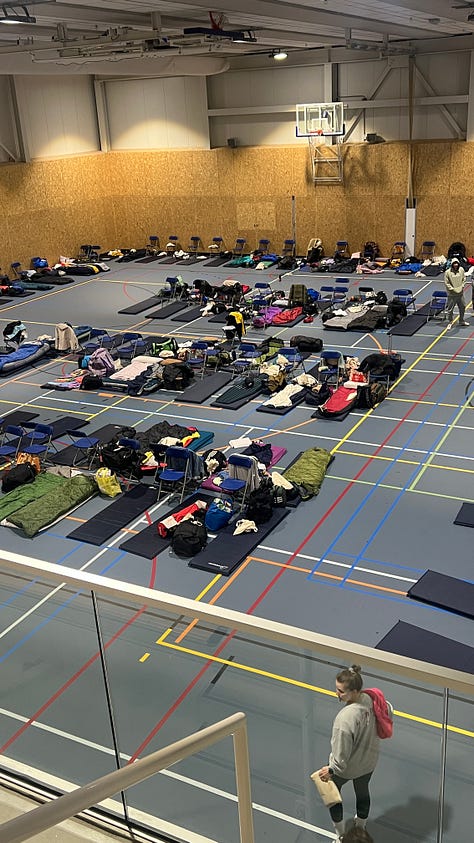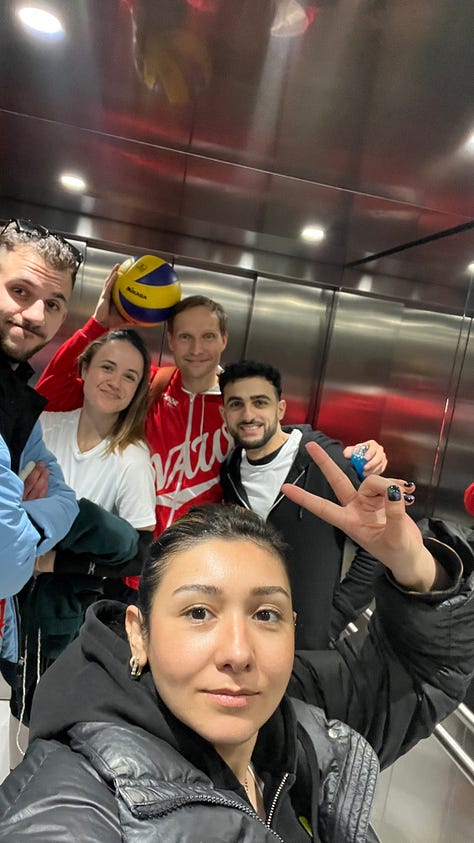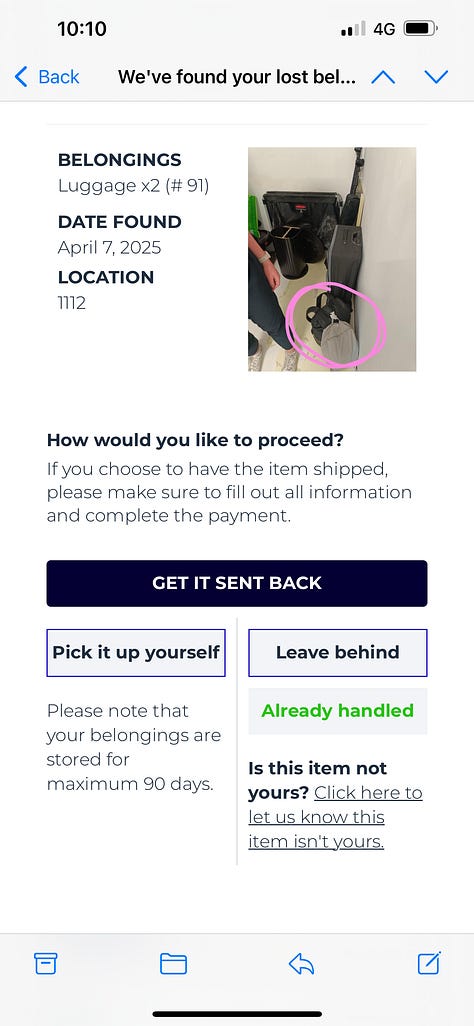Good morning everyone!
Last weekend, I travelled to Rotterdam for a tournament. On Sunday evening, back in London, getting off my friend’s car, I realized that I left half of my things back at the hotel. This essay is in part a philosophical reflection and a mild cautionary tale about the experience of forgetting.
I’ve always been a forgetful person. I leave things behind: scarves at parties, chargers (or passports!) at airports, water bottles at the gym. And it’s not absentmindedness exactly. It’s more that I always carry too much. Everywhere I go, I carry too many things—out of a need to be ready and prepared for anything life might throw at me: the rain, an injury, passing time. I’ve been told that my bag in turn contains items for every imaginable scenario.
Perhaps what I’m trying to avoid is the feeling of regret—that searing, useless hindsight when you almostpacked something but didn’t. So, I overpack. And when you carry that many things, eventually something will slip away.
I imagine my belongings like animated objects from Beauty and the Beast, gleefully seizing the moment to escape. Go on, be free—fifth pair of sunglasses, second charger, rarely-worn-but-highly-specific party top. I understand. You were tired of being lugged around.
That Sunday, when I stepped out of my friend’s car and realized that my backpack and clothes bag was not in the trunk of the car, my stomach dropped. No…it can’t be. Can it? You know how your mind suddenly traces back to the moment you could have done something differently and searches for some external factor blame: I knew I should’ve taken my stuff with me instead of leaving them in the hotel’s storage. Then I shook it off. It’s fine. I’ll get them shipped. There’s always a solution.
On the Uber ride home, I mentally inventoried everything in that bag. My headphones. I winced at the thought of being separated from music. But I had backups at home. My favorite blouse, power bank, makeup bag, massage gun attachments. All accounted for in memory.
The next few days became a lesson in modern inefficiency—an orchestration of phone calls, emails, and bureaucratic dead ends, despite the promise of a seamlessly connected world. My phone didn’t allow international calls. EE’s customer service led me in loops. Finally, after rebooting my phone, I reached the hotel.
“My colleague who found the items is on lunch break,” the receptionist said, “but we’ll send you the shipping link when she’s back.”
I’m very much pro-long lunch breaks, but after eight hours of receiving no response from the hotel, I followed up via email. In the link they sent me, the charge for next-day delivery was £219. I started asking friends, anyone from the tournament who might still be in Rotterdam and returning to London. Eventually, I chose DHL, which was significantly cheaper and faster.
Then came the customs issue. A £200 duty tax appeared. After several calls and a few emails, I confirmed: these are personal belongings. Not subject to customs fees.
Then came another surprise. On Friday, after days of tracking delays, I called DHL again—£7 a minute.
“We’ve identified a power bank and other flammable items,” said the voice on the line.
“You can discard the power bank,” I said.
A pause. “And other flammable items,” the voice repeated.
I Googled DHL prohibited items. I read the list with quiet horror. USB chargers. Makeup. Face cream. Any combination of liquids, gels, and electronics in the same parcel. It was a list describing everything in my bag.
It hit me then: this bag might never return. Unless they removed almost everything except the clothes. And to my surprise, I was okay with that. Even calm. As I thought about each item—the charger, the luminizer, the blouse—they began to lose their weight. They became what they were all along: things. Replaceable, consumable, inconsequential.
This acceptance surprised me. I’ve never been good at letting go. I keep things for someday. I hoard receipts, old shirts, packaging. But here I was, ready to part with it all. Even the “essentials” are not really essential. We adapt. We replace. We do without.
There’s power in realizing that your attachment to objects doesn’t have to define you. That your identity is not tied to what you carry, or even what you lose. There is a strange kind of liberation in letting it go, in making peace with the idea that these things will not come back. It’s a fresh start, whether you asked for one or not.



I remembered something a friend once told me: Forgetting something is the unconscious act of wanting to return. A tether to the place or the people we’ve left behind. Freud, ever suspicious of coincidence, suggests that forgetting isn’t always accidental. It may be a symptom—of desire, ambivalence, avoidance.
The delays, the red tape, the maddening loop of logistics—it made me wonder if I should have just flown to Rotterdam and fetched the bag myself. Instead, I was reminded of I, Daniel Blake, Ken Loach’s film about an elderly man’s Kafkaesque journey through Britain’s welfare system. The exhausting absurdity of bureaucracy that keeps the most ordinary tasks just out of reach.
In the end, this wasn’t just about a forgotten bag. It was about a subtle reorientation of self. About realizing that what we think we need, we often don’t. And about the strange, quiet freedom in forgetting—an act that seems so passive but might just be one of the most profound ways of letting go.
I’ll keep you posted and hopefully reunite with my belongings. But even if not, they’re just things.
Have a lovely Sunday,
Melis




